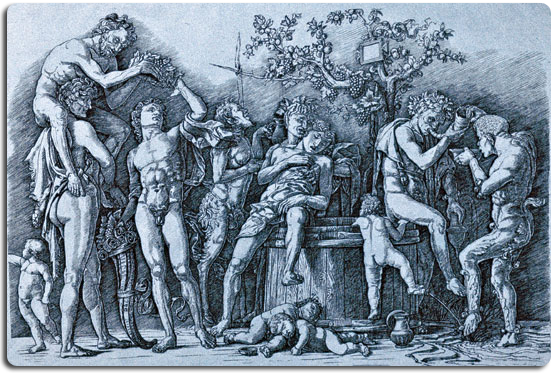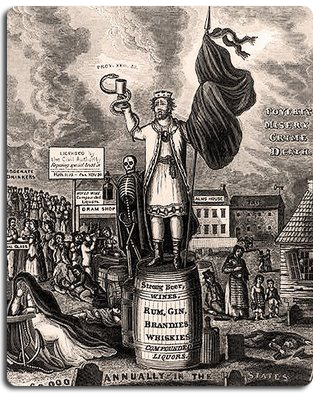There are proves that show us that beginning with 6.000 B.C. alcoholic drinks were consumed by ancient civilations. So, the oldest alcoholic drinks were prepared by potatoes or sugar fermentation.But these drinks had a lower concentration of alcohol, because a bigger concentration needed a longer fermentation. When arabs brought in Europe in the Middle Ages the technique of distillation, the alchemists believed that they discovered the elixir of life. This process raises considerably the quantity of alcohol and in most countries the law imposed limits of alcohol admitted in drinks.
Production of wine has its origins in the Middle East, where vineyards gave fray without special care. It assigns the Old Testament's Noah planted the first crops of vineyards, deeming him the first person who was drunk.
 Since 2000 B.C. in the Sumerian city of Nippur, beer and wine were used as a tonic drink for medical reasons and the religious manifestations of the ancient Egyptians and Assyrinas included parties alcoholic beverages where consumed and these parties lasted for few days.One of the most popular Egyptian gods, Osiris, was considered to be the first grower of vineyards and the one who produced beer from cereals.People started to produce alcohol for practical reasons. Wine production began in Antique Egypt, when Egyptians realized that the grape juice breaks fast, but fermented grape juice or wine is well kept. They had problems, too, with drinking water, which was unclean, and noticed that wine drinking doesn’t make them sick.
Since 2000 B.C. in the Sumerian city of Nippur, beer and wine were used as a tonic drink for medical reasons and the religious manifestations of the ancient Egyptians and Assyrinas included parties alcoholic beverages where consumed and these parties lasted for few days.One of the most popular Egyptian gods, Osiris, was considered to be the first grower of vineyards and the one who produced beer from cereals.People started to produce alcohol for practical reasons. Wine production began in Antique Egypt, when Egyptians realized that the grape juice breaks fast, but fermented grape juice or wine is well kept. They had problems, too, with drinking water, which was unclean, and noticed that wine drinking doesn’t make them sick.In Greece, the drink was not actually known before the occurrence of new god Dionysos (god of vinyards and parties).
By the VIIth century B.C., the consumption of alcoholic beverages has become an important part of everyday life. The Greeks noted that although wine can create an enjoyable mood, may also determine people to do things that normally they would not do or even go out of their minds. Greek philosophers such as Socrates or Plato recommended thrift and inculpated alcohol abuse. However, it is known that their advice was often ignored, and one of those who ignored this was Alexander the Great, who is believed to have died during a party at the age of 33, after he conquered almost all the known world.
In the year 539 B.C. it is supposed that drunkenness have led to the fall of Babylon. Persians attacked and destroyed the city during a festival where all the people were drinking.
The Romans were familiar with wine and although the Greeks had conquered Greece, they were actually conquered by Greek culture, by their gods, and love for Greek wine. The Romans transformed Bacchic holidays (Dionysos became Bachus, in Latin) in the event of a magnitude unknown at the time, characterized by excess of food and alcohol, strange religious ceremonies, ritual murders.Consumption of alcoholic beverages was popular among the upper classes and among managers of the Roman Empire.It was sold and used in Spain, France, Germany and the British Isles. As the luxury and ambition led to the decline of Rome, greed and drink caused the kings decay and death.
Christianity helped in establishing a moderate consumption of alcoholic beverages, but even then, wine has become an important issue in certain religious rites, finding its "victims" among priests .. Later, the wine has become important for the Roman Catholic church, as it was used during the holy Mass.During Renaissance, alcoholic beverages have become important in European society.Alcoholic beverages were produced and widely promoted by
 the guild of merchants who have finished.
the guild of merchants who have finished.Around 1300 there was a “beer” industry in Central Europe. In this period, the wine continued to grow in popularity. There are also many varieties of wine named after their place of origin. Although alcohol initially appeared in the practical use, this has changed subsequently. People began to try different types of alcohol and consumption of alcoholic beverages has become a part of European culture.
The traditional consumption of alcohol at parties was more frequent in Anglo-Saxon countries and in northern Europe, known as dry drinking cultures, compared to the Mediterranean. In Mediterranean countries, alcohol (especially wine) is socially powerful. Wine is an important component of Mediterranean diet and is typically consumed almost every day in moderate amounts during meals taken with family and friends. Although many people in Anglo-Saxon countries share this pattern of alcohol consumption, there is also a tradition of consumption of alcohol outside mealtimes and in particular after meals without family or friends.
Although the traditional countries of Southern Europe had a pattern of higher consumption, largely derived from daily consumption of wine during meals, this model tends to change.
Thus, spirits have been expanded from one country to another, being transformed according to the type of fruit tastes and existing residents: vodka produced in Russia from potatoes, whiskey, beer, gin, brandy in Europe, beer in British Isles and Germany, "Saki" in Japan, "soma" in China, "chica" and "pulque" in South America, rum in the Caribbean.
Whether it helped to shift over the tests of life, whether accompanied the happy moments, alcohol accompanied always man. Almost every civilization that ever existed on the earth had the recipe preparation beer, fermented wine or distilled spirits.